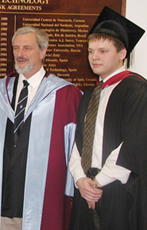Cooling Growth Grid: An incremental self-organizing artifical neural network for data exploration
 Vladimir Tomenko graduated from Kharkiv National University of Radioelectronics, Ukraine and has recently passed his MPhil viva at WIT with a thesis on ‘Cooling Growth Grid: An incremental self-organizing artifical neural network for data exploration’. The external examiner was Dr Gopinath Chandroth from Lloyds Register EMEA, London and the internal examiner was Prof Carlos Brebbia.
Vladimir Tomenko graduated from Kharkiv National University of Radioelectronics, Ukraine and has recently passed his MPhil viva at WIT with a thesis on ‘Cooling Growth Grid: An incremental self-organizing artifical neural network for data exploration’. The external examiner was Dr Gopinath Chandroth from Lloyds Register EMEA, London and the internal examiner was Prof Carlos Brebbia.
In the thesis self-organizing artificial neural networks with a predefined number of neurons (SOM) and incremental ones are investigated; different goals of competitive learning are described. It is established that static and incremental self-organizing ANNs represent quite different approaches. SOM tries to find main dimensions of input space distribution, whereas incremental networks are focused on generating fine topological structures, describing input space distribution in detail. The estimation of growth direction in incremental models is found to be haphazard, especially for real-world data, containing noise and having different actual and intrinsic dimensionalities. On the other hand, the incremental approach overcomes several drawbacks of SOM, such as predefined grid dimensionality. A novel incremental self-organizing ANN Cooling Growing Grid is proposed, which combines advantages of SOM and incremental approaches and overcomes their main drawbacks. The estimation of growth direction is made less haphazard, weights adaptation rule is modified in order to achieve better performance for highly nonuniform real-world data. Main performance measures for evaluation of both topological structure and receptive-field centers distribution are investigated in order to compare CGG with existing models. The results of the evaluation justify the appropriateness of the CGG model. For real-world data sets it exceeds both incremental models and SOM according to chosen criterion.
Vladimir presented a first class MPhil thesis and as a result of his research both examiners recommended that he be awarded the degree of Master of Philosophy. As a result, Vladimir has been accepted to carry out PhD research at this Institute funded by an EU project.


 Wessex Institute
Wessex Institute